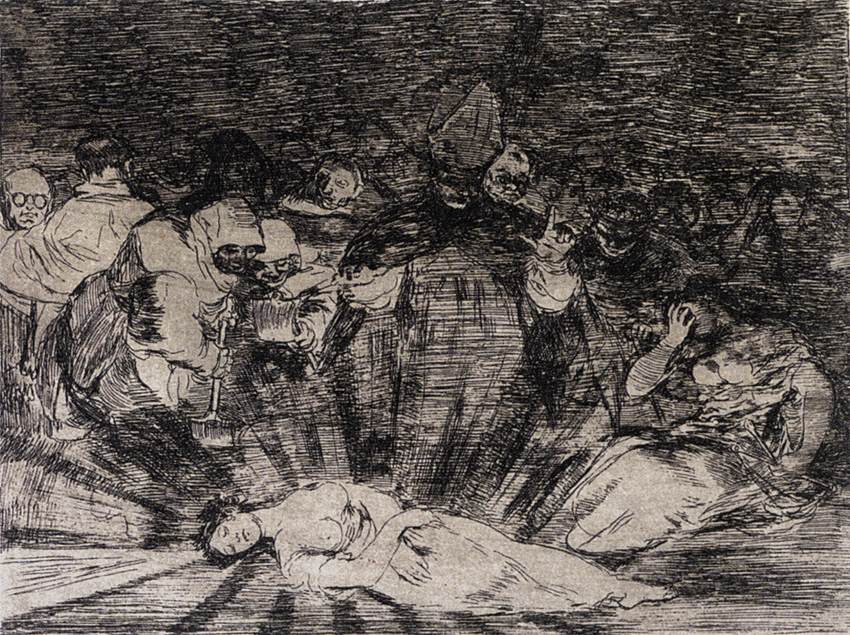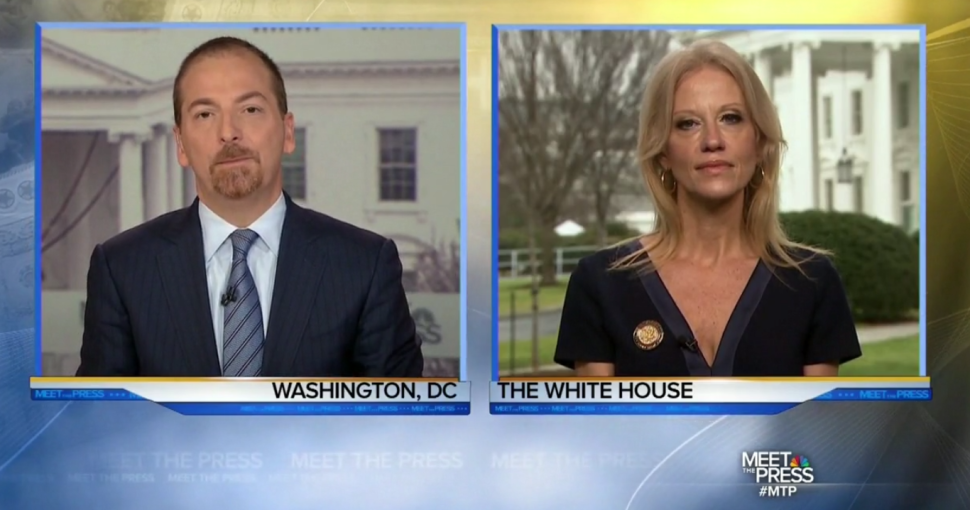An Honest Mistake
by Shivani Radhakrishnan

Francisco Goya. Murió la verdad (Truth Has Died), from The Disasters of War.
c. 1815–20. Etching and burnisher. 7 × 8 3⁄4 in.
This article appears in Even no. 6, published in spring 2017.
A few months after I’d first moved to Russia, for a year-long stint teaching conversational English and a class that should have been called “Topics that Interest My Instructor” (it was billed as “International Relations”), I had a number of improbable awakenings about language’s slipperiness. The first was my discovery that doves and pigeons belong to the same family of birds; where English has two words, Russian has only one. Flustered, standing in front of my class, all I managed was that Henry James didn’t write The Wings of the Pigeon for a reason. My second realization came a little later, and was a little more philosophical. Russian, as it happens, has two words for truth — pravda and istina. In English we sometimes suggest the distinction by talking about “capital T-Truth.” For a Russian speaker, it’s a bit easier: pravda rings of justice and fairness, and istina is more literary, more liturgical, connected with questions of being.
Truth and its nature have puzzled fine philosophical minds for centuries, and not just questions about the relationship between the big-T and the little-T varieties. Now every second headline is about how we are “post-fact” and “post-truth,” which is enough to make even a post-structuralist nostalgic. The anecdotes are familiar. Leave voters during the Brexit referendum argued that EU membership cost Britain £350 million a week, without comment on the money received in turn. Putin told the world that there were no Russian soldiers in Ukraine, even while the media was flooded with images and videos of his army in Crimea. Checkers from PolitiFact found that about 70% of Donald Trump’s assertions fell into categories like “mostly false,” “false,” and my favorite, “pants on fire.”
What bizarre days these are. The diagnosis, steadily gaining purchase in news outlets, is that we’ve left facts behind, and all that remains is interpretation. Peter Pomerantsev, a Soviet-born British writer and former producer for a Moscow TV station, wrote recently that “every version of events is just another narrative, where lies can be excused as ‘an alternative point of view’ or ‘an opinion,’ because ‘it’s all relative’ and ‘everyone has their own truth’ (and on the internet they really do).” Accordingly, Trump is the culmination of a more general tendency, one that levels all differences between truth and falsehood, a current originating in the humanities (with postmodernists arguing that facts and reason are forms of domination) and owing outwards. I’m struck by the transcendence of the tale, echoing as it does Allan Bloom’s conservative critique of the American university in The Closing of the American Mind.

But the perfectly simple explanation we’ve been offered — we’re entering a post-truth politics! — conceals something important: we still care, and deeply, about truthfulness. In Trump’s case, the ease of asserting and accepting falsehoods is one part of the story, sure. What’s more interesting, though, is that bald-faced lying is coupled with a devotion to truthfulness, or at any rate two commitments I take to be connected to truthfulness: a kind of readiness against being fooled, and an artlessness some take for sincerity. It’s not hard to notice Trump’s fear of being swindled, once one starts paying attention. The new president can’t stop talking about how we’ve negotiated “horrible deals,” like NAFTA or the Iran nuclear agreement, but his talk focuses less on the details of either than on a feeling that we’ve been taken in by other, self-interested power players. (Though Trump voters’ suspicion of news media, liberal elites, and the Washington establishment seems miles from the left’s distrust of gender and racial hierarchies, markets and corporate interests, they converge here: the way things present themselves just can’t be the way things really work.) When Trump rails against the “political correctness” of liberal elites, he’s seen as a champion of sincerity, a defender of a politics where what people say reveals what they feel. Whether or not he is telling the truth is immaterial.
“A sentence uttered makes a world appear / Where all things happen as it says they do,” begins one of W.H. Auden’s late sonnets, and although he was likely optimistic about our words generating new worlds in poetry, I recognize in these lines a different, more contemporary feeling — that without getting the facts right, we’re unmoored from the way things really are. This is all jarring, no doubt. Nonetheless, we don’t collect truths like we do seashells. What our attachment to truthfulness underscores is that we can’t think only about rightness over and against wrongness. Even while eschewing facts, Trump and Trump supporters rely on truth-related values. And this is important to bear in mind, not only philosophically, but also politically.
What our current predicament suggests is familiar from Heidegger: things can be more or less revealed. Certain attitudes, interests, and emotions beneath the surface can become visible and require our attention. Perhaps these things were there all along, but now, anyway, they are unconcealed. What’s more, Heidegger thinks that false belief illuminates differently from true belief, just as the “dark denies visibility because it can also afford vision.” In the dark, Heidegger reminds us, “we see the stars,” while in the daylight we cannot see them at all. Not that we should relish our distance from the clearest, most correct view of things in our “post-truth,” “post-fact” age; we can still accept that our vision in daylight is better than at night. But all the same, false beliefs, like night vision, are a kind of vision— one that might provide some glimpses of genuine truth.